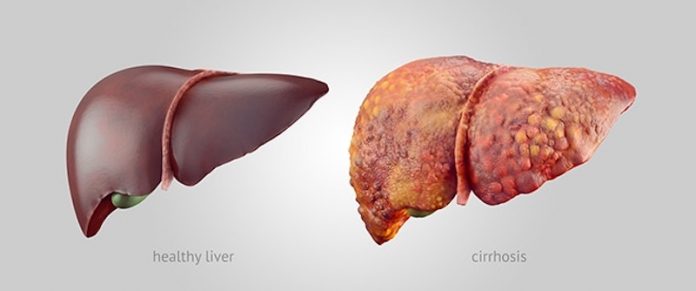
Cirrhosis is a condition in which your liver is scarred and permanently damaged. Scar tissue replaces healthy liver tissue and prevents your liver from working normally.
Scar tissue also partly blocks the flow of blood through your liver. As cirrhosis gets worse, your liver begins to fail.
Many people are not aware that they have cirrhosis, since they may not have signs or symptoms until their liver is badly damaged.
How common is cirrhosis?
Researchers estimate that about 1 in 400 adults in the United States has cirrhosis. Cirrhosis is more common in adults ages 45 to 54.
About 1 in 200 adults ages 45 to 54 in the United States has cirrhosis. Researchers believe the actual numbers may be higher because many people with cirrhosis are not diagnosed.
Who is more likely to get cirrhosis?
People are more likely to get cirrhosis if they have certain health conditions. People are also more likely to get cirrhosis if they:
have abused alcohol NIH external link for a long time
have type 2 diabetes
are men
are older than age 50
What are the complications of cirrhosis?
As the liver fails, complications may develop. In some people, complications may be the first sign of the disease. Complications of cirrhosis may include the following.
Portal hypertension
Portal hypertension is the most common serious complication of cirrhosis.
Portal hypertension is a condition that occurs when scar tissue partly blocks and slows the normal flow of blood through your liver, which causes high blood pressure in the portal vein.
Portal hypertension and its treatments may lead to other complications, including
enlarged veins—called varices—in your esophagus, stomach, or intestines, which can lead to internal bleeding if the veins burst
swelling in your legs, ankles, or feet, called edema
buildup of fluid in your abdomen—called ascites—which can lead to a serious infection NIH external link in the space that surrounds your liver and intestines
confusion or difficulties thinking caused by the buildup of toxins in your brain, called hepatic encephalopathy
Infections
Cirrhosis increases your chance of getting bacterial infections NIH external link, such as urinary tract infections and pneumonia NIH external link.
Liver cancer
Cirrhosis increases your chance of getting liver cancer NIH external link.3 Most people who develop liver cancer already have cirrhosis.
Liver failure
Cirrhosis may eventually lead to liver failure. With liver failure, your liver is badly damaged and stops working. Liver failure is also called end-stage liver disease. This may require a liver transplant.
If you care about liver health, please read studies that people with diabetes need to prevent this dangerous liver disease and 5 big myths about liver detoxing you should know.
For more information about liver health, please see recent studies about oral diseases linked to a 75% increase in liver cancer risk, and results showing a new way to treat chronic liver disease.



